否定句型L
英语四个基本时态的 肯定句变否定句

_M_r_s_.__L_i_a_n_d__K_i_t_t_y__a_r_e__n_o__t_i_n__a_b__ig__s_h_o_p__. ________ .
8. He is crying(哭) under the tree.
____H__e_i_s_n__o_t__c_r_y_i_n_g_(__哭__)___u_n_d_e_r__t_h_e__t_r_e_e__. _____ .
9. His birthday is on the twentieth of November.
The old man doesn’t do morning exercises(早操) every morning.
23. We are from China.
_________W___e__a_r__e_n__’t__f__r_o_m___C__h_i_n_a__.________ .
24. He goes to the library(图书馆) on Sundays.
_____H_e__d_o_e_s_n_’_t__g_o_t_o__th__e_l_ib_r_a_r_y__o_n_S_u_n_d_a_y_s_.____ .
25. They have a class meeting every week.
_T_h__e_y_d__o_n_’t__h_a_v_e__a__c_l_a_s_s_m__e_e_t_i_n_g__e_v_e_r_y__w__e_e_k_. .
英语双重否定句几种常见句型[1]
![英语双重否定句几种常见句型[1]](https://img.taocdn.com/s3/m/a94b30b86529647d27285276.png)
英语双重否定句的几种常见句型英语句子中常可见到两个表示否定意义的词连用的情况,这一现象常称为双重否定。
这种句子形式上虽为否定,实则表示强烈的肯定语气。
英语双重否定句常见的有如下三种句型:1、否定词no/not等+表示否定意义的形容词。
例如:He has no small reputation as a scientist.他是名气很大的科学家。
No way is impossible to courage.勇士面前无险路。
It is not uncommon for students to have friendly relationship with their teachers.学生与老师建立友好关系并不罕见。
It is conflict and not unquestioning agreement that keeps freedom alive.使自由保持活力的是冲突而不是绝对的一致。
Nothing is unnecessary.没有什么是不必要的。
2、否定词no/not/never等+without…No smoke without fire·[proverb][谚]无火不起烟;无风不起浪。
We cannot succeed without your help.没有你们的帮助,我们就不能成功。
They never meet without quarreling.他们每次见面必吵架。
Nothing to be got without pains but poverty.[proverb][谚]只有贫穷是可以不劳而获的。
3、否定词no/not/never/nobody/few等+具有否定意义的动词或短语。
There is no denying the truth.真理是不能否认的。
The tart reply did not discomfort him.那尖刻的回答并没有使他难过。
否定句的否定词和句型结构分析

否定句的否定词和句型结构分析在英语语法中,否定句是我们日常表达中不可或缺的一部分。
否定句的构成离不开否定词以及特定的句型结构。
本文将对否定句的否定词和句型结构进行详细分析,帮助读者更好地理解和运用。
一、否定词的分类及用法否定词是构成否定句的关键部分,它可以通过否定一个陈述或命令句来改变句子的意义。
常见的否定词有not、no、never、neither、nor、nobody、nowhere等。
1. notnot是最常用的否定词,可以单独出现在句子中,放在谓语动词之前,用于否定陈述句。
例如:- I am not happy.(我不开心。
)- He does not like pizza.(他不喜欢披萨。
)2. nono用于自我否定,意为“没有”或“不是”,常用于谢绝请求或回答问句时。
例如:- Can I have some tea? No, sorry.(我可以喝点茶吗?不,抱歉。
)- Do you have any questions? No, I don't.(你有什么问题吗?没有。
)3. nevernever意为“从未”,用于否定过去的经历或行为,常与一般过去时连用。
例如:- I have never been to China.(我从未去过中国。
)- She never eats meat.(她从不吃肉。
)4. neither/norneither和nor都表示“两者都不”,常用于否定选择。
neither用于肯定句,nor用于否定句。
例如:- Neither Tom nor Mike likes football.(汤姆和迈克都不喜欢足球。
)- I don't like coffee. Neither do I.(我不喜欢咖啡,我也不喜欢。
)5. nobody/no onenobody和no one都表示“没有人”,用于否定陈述句中的主语。
例如:- Nobody knows the answer.(没有人知道答案。
否定句翻译

否定句翻译Negative Sentencesa.not...to do...结构They do not conduct the dangerous experiment to serve their private interest but to benefit man.误: 为了他们的利益,也为了人类的利益,他们没有进行这种危险的实验。
正:他们进行这种危险的实验不是为了图私利,而是为了造福人类。
People did not shake off colonialist?s yoke [ j?uk ] 支配in order to put on hegemonist?s[ hi'gem?nist] .误: 人们没有摆脱殖民主义的束缚,是为了套上霸权主义的枷锁。
正:人们摆脱殖民主义的束缚,不是为了套上霸权主义的枷锁。
b.not...because (of )...结构We should not scamp [ sk?mp ] 大意our work because we are pressed for time or because we have our hands full.误: 我们对工作不能马马虎虎,因为我们时间很紧,工作太忙。
正:我们可不能因为时间太紧或工作太忙就对工作马马虎虎。
The seed does not complain because there are stones and turf [ t?:f ]草皮in way.误: 种子没有抱怨,因为在它的道路上有石头和草皮。
正:种子并不因为有石头和草皮挡住它的路而抱怨。
Conclusion否定转移:将意义上属于从句、次干结构(状语)的否定词转移到主句或主要动词之上。
1. 将think, believe, suppose, expect, fancy, imagine等动词后面宾语从句的否定词转移到主句中,即主句的谓语动词用否定式,而从句的谓语动词用肯定式。
肯定句、否定句、肯定句、否定句、一般疑问句和特殊疑问句的详解

肯定句、否定句、肯定句、否定句、一般疑问句和特殊疑问句的详解一、be动词:am, is, are二、肯定句、否定句、一般疑问句和特殊疑问句定义1.肯定句:表示肯定的意思, 即不含有否定词“不”。
比如:我是一个学生 I a m a s tuden t. 他去上学 He goes to s chool. 2.否定句:表示否定的意思。
比如:我不是一个男孩。
I am n ot aboy 他不去上学He do es no t goto sc hool. 3. 一般疑问句:回答为“是 yes”或者“否no”的问句。
比如:你是一个学生吗?Are y ou astude nt? 你喜欢英语吗? Doyou l ike E nglis h? 特殊疑问句:以疑问词开头,对句中某一成分提问的句子叫特殊疑问句。
常用的疑问词有:特殊疑问句whatwho w hosewhich when wher e how why等。
特殊疑问句有两种语序:特殊疑问句有两种语序:1.如疑问词作主语或主语的定语,即对主语或主语的定语提问,其语序是陈述句的语序:疑问词(+主语)+谓语动词+其他成分?如:who i s sin gingin th e roo m? wh ose b ike i sbro ken?2.如疑问词作其他成分,即对其他成分提问,其语序是:疑问词+一般疑问句语序?如: what clas s are youin?W hat d oes s he lo ok li ke?W hereare y ou fr om?W hat t ime d oes h e get up e verymorni ng?H ow do youknow?特殊疑问词+助动词+主语+动词原形+其他?特殊疑问词+助动词+主语+动词原形+其他?eg:Wh ere d o you do s tudyEngli sh? 特殊疑问词+be 动词+主语+其他?特殊疑问词+b e 动词+主语+其他? eg:Why i s you r Mum so a ngry?特殊疑问词+情态动词+主语+动词原形+其他?特殊疑问词+情态动词+主语+动词原形+其他? eg:Whatcan Ido f or yo u? 注意:1.回答特殊疑问句时,不能用 yes/ no,即问什么答什么,尤其是简略回答。
否定句的结构和常见句型
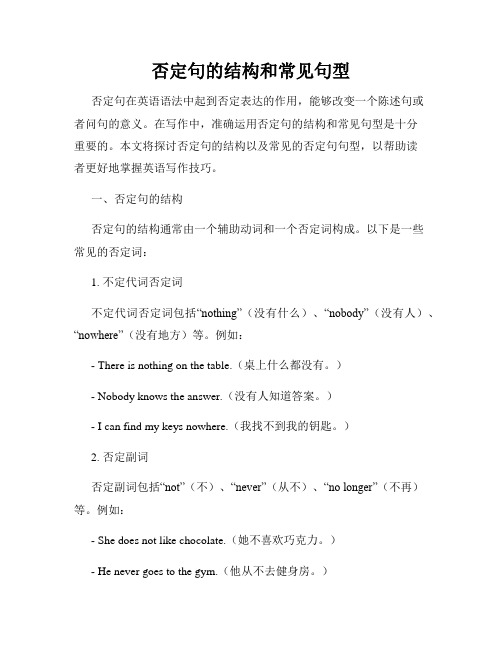
否定句的结构和常见句型否定句在英语语法中起到否定表达的作用,能够改变一个陈述句或者问句的意义。
在写作中,准确运用否定句的结构和常见句型是十分重要的。
本文将探讨否定句的结构以及常见的否定句句型,以帮助读者更好地掌握英语写作技巧。
一、否定句的结构否定句的结构通常由一个辅助动词和一个否定词构成。
以下是一些常见的否定词:1. 不定代词否定词不定代词否定词包括“nothing”(没有什么)、“nobody”(没有人)、“nowhere”(没有地方)等。
例如:- There is nothing on the table.(桌上什么都没有。
)- Nobody knows the answer.(没有人知道答案。
)- I can find my keys nowhere.(我找不到我的钥匙。
)2. 否定副词否定副词包括“not”(不)、“never”(从不)、“no longer”(不再)等。
例如:- She does not like chocolate.(她不喜欢巧克力。
)- He never goes to the gym.(他从不去健身房。
)- I am no longer interested in that book.(我对那本书不再感兴趣。
)3. 否定形容词否定形容词包括“unhappy”(不快乐)、“inhospitable”(不好客)、“impossible”(不可能)等。
例如:- The little girl is unhappy about the news.(小女孩对这个消息感到不开心。
)- The hotel staff were inhospitable to us.(酒店员工对我们不友好。
)- It is impossible to finish the task in such a short time.(在这么短的时间内完成任务是不可能的。
)二、常见句型1. 否定陈述句否定陈述句与肯定陈述句在结构上基本相同,只是在谓语动词前添加否定词。
英语单词中的否定前缀 un,il ,
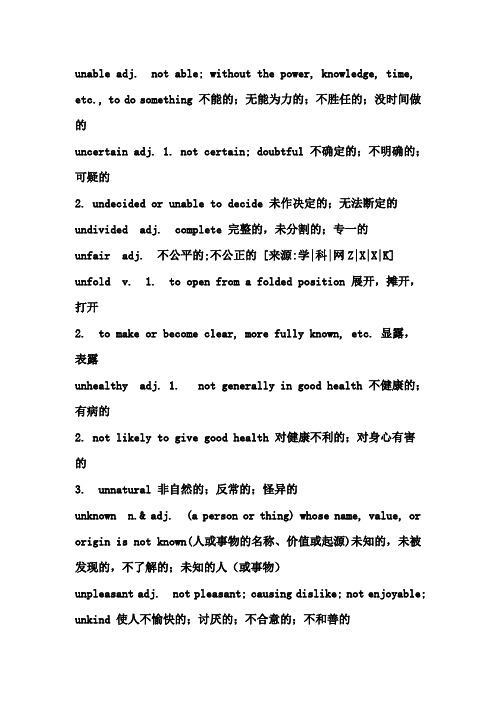
unable adj. not able; without the power, knowledge, time, etc., to do something 不能的;无能为力的;不胜任的;没时间做的uncertain adj. 1. not certain; doubtful 不确定的;不明确的;可疑的2. undecided or unable to decide 未作决定的;无法断定的undivided adj. complete 完整的,未分割的;专一的unfair adj. 不公平的;不公正的 [来源:学|科|网Z|X|X|K]unfold v. 1. to open from a folded position 展开,摊开,打开2. to make or become clear, more fully known, etc. 显露,表露unhealthy adj. 1. not generally in good health 不健康的;有病的2. not likely to give good health 对健康不利的;对身心有害的3. unnatural 非自然的;反常的;怪异的unknown n.& adj. (a person or thing) whose name, value, or origin is not known(人或事物的名称、价值或起源)未知的,未被发现的,不了解的;未知的人(或事物)unpleasant adj. not pleasant; causing dislike; not enjoyable; unkind 使人不愉快的;讨厌的;不合意的;不和善的-unpleasantly adv.. -unpleasantness n.unreserved adj. without limits or reservations 无限制的,无保留的;充分的;坦白的unrest n. 不安;骚动unsold adj. 未销售的unsuccessful adj. 不成功的;失败的illegal [i'li:gəl] a.违法的illegitimate [`ili'dʒitimit] a.不合法的;私生的illicit [i'lisit] a.违法的illiterate [i'litərit] a.文盲的illusion [i'lu:ʒən] n.假象,错觉illusive [i'lu:siv] a.迷惑人的,迷幻的illusory [i'lu:səri] a.虚幻的illustrate ['iləstreit] v.为…作插图或图表;说明,阐明inadvertence [`inəd'və:təns] n.漫不经心inadvertently [`inəd'və:təntli] adv.不小心地,非故意地inalienable [in'eiljənəbl] a.不可剥夺的inane [i'nein] a.无意义的;空洞的inanimate [in'ænimit] a.无生命的inappreciable [`inə'pri:ʃəbl] a.微不足道的incessant [in'sesnt] a.无间断的,连续的inchoate ['inkəueit] a.刚开始的;未发展的incogitant [in'kɔdʒitənt] a.无思想的,考虑不周的incommensurate [`inkə'menʃərit] a.不成比例的,不相称的incompatible [`inkəm'pætəbl] a.不能和谐共存的incompetent [in'kɔmpitənt] a.无能力的,不能胜任的incongruity [`inkɔŋ'gru(:)iti] n.不协调,不相称inconsequential [in`kɔnsi'kwenʃəl] a.不重要的,微不足道的incontrovertible [`inkɔntrə'və:təbl] a.无可辩驳的incorrigibility [in`kɔridʒə'biliti] n.无可救药incorrigible [in'kɔridʒəbl] a.积习难改的,不可救药的incorruptible [`inkə'rʌptəbl] a.(道德上)不受腐蚀的incredulity [`inkri'dju:liti] n.怀疑,不相信indebted [in'detid] a.感激的,感恩的indecipherable [`indi'saifərəbl] a.无法破译的indecisive [`indi'saisiv] a.非决定性的,迟疑不决的indefatigable [`indi'fætigəbl] a.不知疲倦的indelible [in'delibl] a.擦拭不掉的,不可磨灭的indeterminate [`indi'tə:minit] a.不确定的,不明确的indifferent [in'difərənt] a.不感兴趣的,漠不关心的indispensability ['indis`pensə'biləti] n.不可缺少indubitable [in'dju:bitəbl] a.不容置疑的ineffectual [`ini'fektjuəl] a.无效的,徒劳无益的inelasticity [`inilæs'tisiti]n.无弹性,无伸缩性ineluctable [`ini'lʌktəbl] a.不能逃避的inept [i'nept] a.无能的;不适当的ineptitude [i'neptitju:d] n.无能,不称职inequity [in'ekwiti] n.不公正,不公平inexhaustible [`inig'zɔ:stəbl] a.用不完的,取之不竭的inexorable [in'eksərəbl] a.不为所动的;坚决不变的inexplicable [in'eksplikəbl] a.无法解释的infelicitous [`infi'lisitəs] a.不幸的,不妥当的infelicity [`infi'lisiti] n.不幸;不恰当inimitable [i'nimitəbl] a.无法仿效的,不可比拟的iniquitous [i'nikwitəs] a.邪恶的,不公正的iniquity [i'nikwiti] n.邪恶,不公正innocuous [i'nɔkjuəs] a.(行为,言论等)无害的insatiable [in'seiʃəbl] a.不能满足的,贪心的inscrutable [in'skru:təbl] a.高深莫测的,神秘的insensate [in'senseit] a.无感觉的;蠢笨的insentient [in'senʃənt] a.无知觉的,无生命的insincerity [`insin'seriti] n.伪善insipid [in'sipid] a.乏味的,枯燥的insoluble [in'sɔljubl] a.不溶解的;不能解决的insolvency [in'sɔlvənsi] n.无力偿还;破产insouciant [in'su:siənt] a.漫不经心的insubordinate [`insə'bɔ:dnit] a.不服从的,反抗的insubstantial [`insəb'stænʃəl] a.非实体的;薄弱的insufficient [`insə'fiʃənt] a.不足的intangible [in'tændʒəbl] a.不可触摸的interminable [in'tə:minəbl] a.无尽头的intermission [`intə(:)'miʃən] n.暂停,间歇intermittent [`intə(:)'mitənt] a.断断续续的,间歇的intransigent [in'trænsidʒənt] a.不妥协的intrepid [in'trepid] a.无畏的,刚毅的inviolable [in'vaiələbl] a.不可侵犯的;不可亵渎的involuntary [in'vɔləntəri] a.无意的invulnerable [in'vʌlnərəbl] a.无法伤害的。
“否定”的翻译 (3)
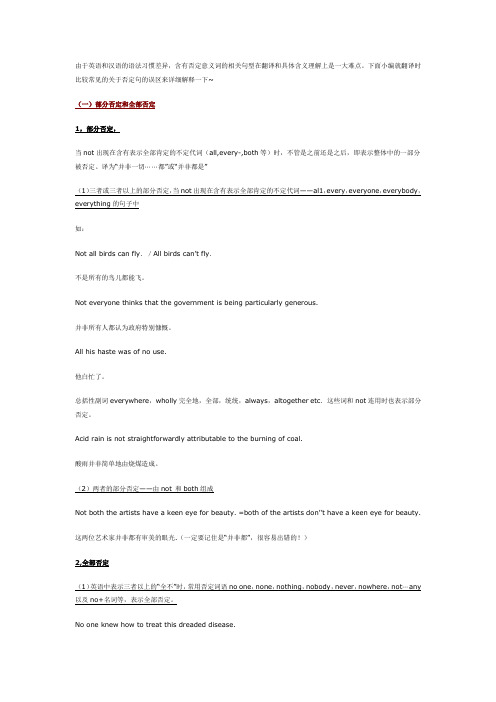
由于英语和汉语的语法习惯差异,含有否定意义词的相关句型在翻译和具体含义理解上是一大难点。
下面小编就翻译时比较常见的关于否定句的误区来详细解释一下~(一)部分否定和全部否定1,部分否定,当not出现在含有表示全部肯定的不定代词(all,every-,both等)时,不管是之前还是之后,即表示整体中的一部分被否定。
译为“并非一切⋯⋯都”或“并非都是”(1)三者或三者以上的部分否定,当not出现在含有表示全部肯定的不定代词——al1,every,everyone,everybody,everything的句子中如:Not all birds can fly./All birds can’t fly.不是所有的鸟儿都能飞。
Not everyone thinks that the government is being particularly generous.并非所有人都认为政府特别慷慨。
All his haste was of no use.他白忙了。
总括性副词everywhere,wholly完全地,全部,统统,always,altogether etc.这些词和not连用时也表示部分否定。
Acid rain is not straightforwardly attributable to the burning of coal.酸雨并非简单地由烧煤造成。
(2)两者的部分否定——由not 和both组成Not both the artists have a keen eye for beauty. =both of the artists don’’t have a keen eye for beauty.这两位艺术家并非都有审美的眼光.(一定要记住是“并非都”,很容易出错的!)2,全部否定(1)英语中表示三者以上的“全不”时,常用否定词语no one,none,nothing,nobody,never,nowhere,not⋯any 以及no+名词等,表示全部否定。
ill的否定含义
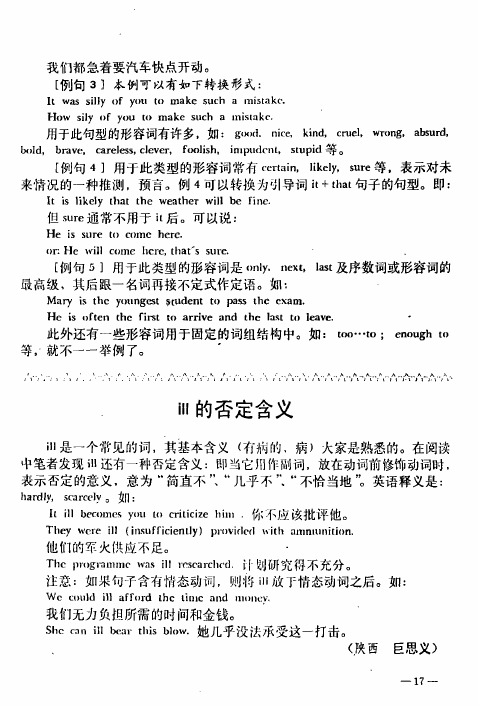
11,
,二 s e a 】 e
l l。〔]
,
计 划研 究得 不 充 分
l i
v 万 1一 吸
。
注意
We
如果句 子 含有情态动 词
ld 111
a
则将
d
。
放 于 情态动 词 之后
。
如
:
e t)一
ff
忆)
r
d
一 h
e
ti
l l一 e
e
t 扒) t
一 n
g C S fis r
t t
,
u t de
n
t
t.
)
P a
d
s
th
t
e
he
e x a
m
t一,
。
.
ft
e 一 1
h
e
t` }
a r r
i
v e
a n
t
Ic a
e v
:
.
等
,
此外还有 一 些形容词 用 于 固定的词 组 结构 中 就 不 一 一 举 例了
。 八 八
、
如
t
t o …o
;
我们都 急着要 汽车快 点开 动 【 本 例可 以 有 如 下 转换形 式 例句
t
。
韶
吸
`一
f
一
产川
t
`
一
t ta
》 `
f
川
s
,
t 《,
ma k
e
s 一l e
,
h
a :
英语19种常用句型
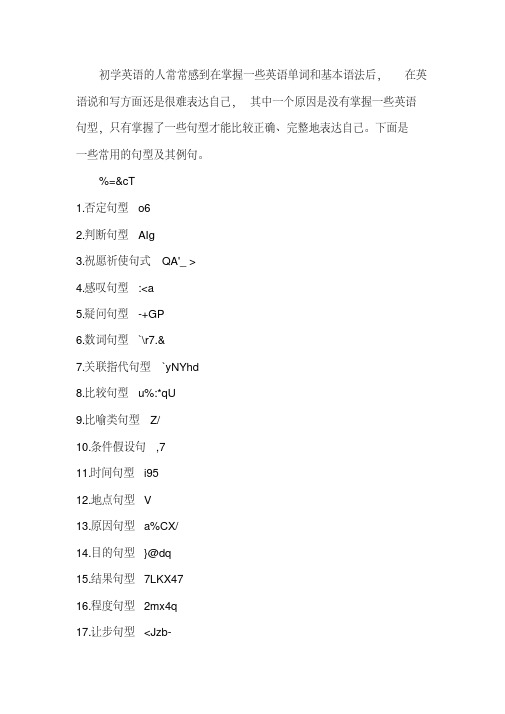
初学英语的人常常感到在掌握一些英语单词和基本语法后,在英语说和写方面还是很难表达自己,其中一个原因是没有掌握一些英语句型,只有掌握了一些句型才能比较正确、完整地表达自己。
下面是一些常用的句型及其例句。
%=&cT1.否定句型o62.判断句型AIg3.祝愿祈使句式QA'_ >4.感叹句型:<a5.疑问句型-+GP6.数词句型`\r7.&7.关联指代句型`yNYhd8.比较句型u%:*qU9.比喻类句型Z/10.条件假设句,711.时间句型i9512.地点句型V13.原因句型a%CX/14.目的句型}@dq15.结果句型7LKX4716.程度句型2mx4q17.让步句型<Jzb-18.转折句型e(19.省略句Z*/}-?英语论坛-- Ho71. 否定句型:\cB'1) 一般否定句~gI don't know this. No news is good news. b[iW'.@( There is no person /not a person/not any person in the house.2)特指否定VVHe went to his office, not to see him. 6P)5I am sorry for not coming on time. 70S9EI don't think/believe/suppose/feel/imagine you are right. z`ox3)部分否定T0BI don't know all of them. QI can't see everybody/everything. 9lW-kAll the answers are not right.(并非所有答案都对。
):6B,All is not gold that glitters. (闪光的不一定都是金子。
否定句型英语
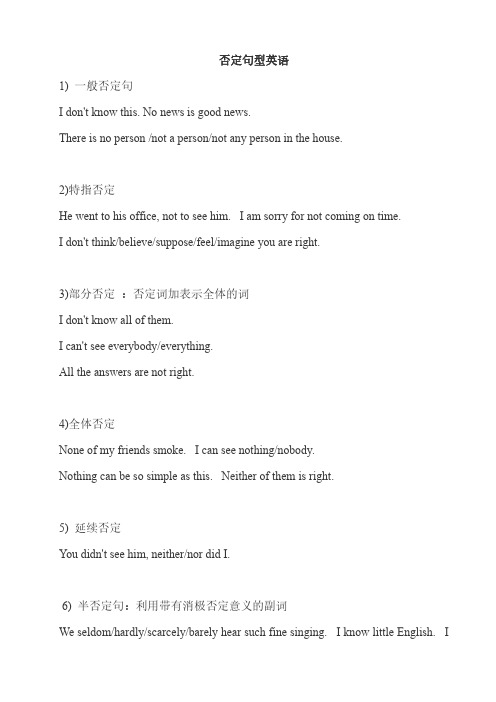
否定句型英语1)一般否定句I don't know this.No news is good news.There is no person/not a person/not any person in the house.2)特指否定He went to his office,not to see him.I am sorry for not coming on time.I don't think/believe/suppose/feel/imagine you are right.3)部分否定:否定词加表示全体的词I don't know all of them.I can't see everybody/everything.All the answers are not right.4)全体否定None of my friends smoke.I can see nothing/nobody.Nothing can be so simple as this.Neither of them is right.5)延续否定You didn't see him,neither/nor did I.6)半否定句:利用带有消极否定意义的副词We seldom/hardly/scarcely/barely hear such fine singing.I know little English.Isaw few people.7)双重否定:双重否定相当于肯定You can't make something out of nothing.What's done cannot be undone.No gain without pains.No man is so old but(that)he can learn.8)排除否定Everyone is ready except you.He did nothing but play. But for your help,I couldn't do it.9)加强否定:利用否定词来加强语气I won't do it at all.。
初中英语语法系列___否定句疑问句

Yehse ,does
. Noh,e doesn’t .
9.Do they come from the U.S.A?
Yethse,y do
. No ,they don’t .
10.Is this an egg?
Yeits , is
.
No ,it
isn’t .
将划四线.对部划分线去部掉分,分提析问句. 意.
They abroexes . These arruelers.
That is an eraser.
Those eararesers.
He is a student.
They astruedents.
This is a bus.
These are bu.ses
That is a pen.
Those are .pens
1.My name is Nancy. Whaty’sour name?
2.I am from China.
Wheraere you from?
3.I am fine . Howare you?
4. Miss.Wang is our English teacher. Who is your English teacher?
3) Do Jane and Maria like China?
肯:Yes, they do. 否:No, they don’t.
4) Is this a ruler?
肯:Yes, it is . 否:No,it isn’t.
5) Is that a desk?
肯:Yes,it is. 否:No,it isΒιβλιοθήκη ’t.2.将下列句子变成单数。
1.They are pencils. It aispencil.
否定句详细讲解
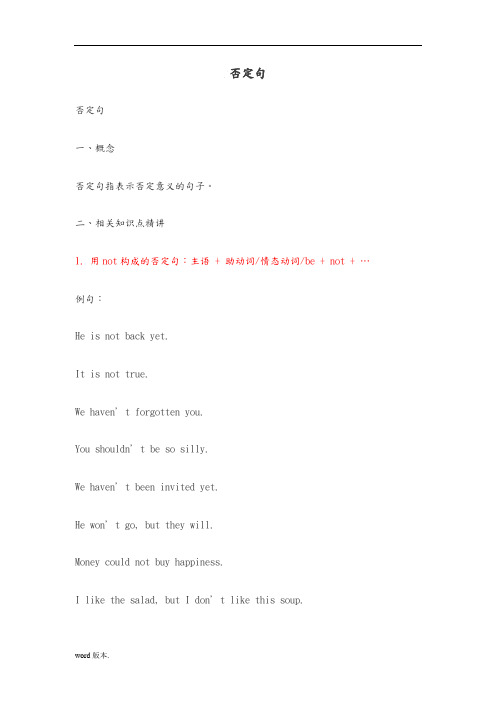
否定句否定句一、概念否定句指表示否定意义的句子。
二、相关知识点精讲1. 用not构成的否定句:主语 + 助动词/情态动词/be + not + …例句:He is not back yet.It is not true.We haven’t forgotten you.You shouldn’t be so silly.We haven’t been invited yet.He won’t go, but they will.Money could not buy happiness.I like the salad, but I don’t like this soup.He wants a girl friend, but he doesn’t want to get married.You didn’t understand what I said, did you?You needn’t try to explain.I didn’t use to like opera, but now I’m getting interested.I usedn’t to like opera, but now I’m getting interested.2. 祈使句的否定句:Don’t + 动词原形…。
例句:Don’t worry. I’ll look after you.Don’t believe a word he says.Don’t be so rude.3. 非谓语动词(不定式,分词,动名词)的否定式:把not放在to do; doing; 的前面。
It’s important not to worry.He said he deeply regretted not being able to help.Not knowing what to do, Shelly asked advice of her friend.He reproached me for not having told it to him.4. not与除谓语以外的其他句子成分连用:Come early, but not before six.It’s working, but not properly.I believe he will succeed, though not without some difficulty.not用在I hope; I believe; I’m afraid; I guess; I suppose; I expect 之后,构成省略句。
PEP五年级专题训练句型转换肯定句,否定句,一般疑问句,特殊疑问句
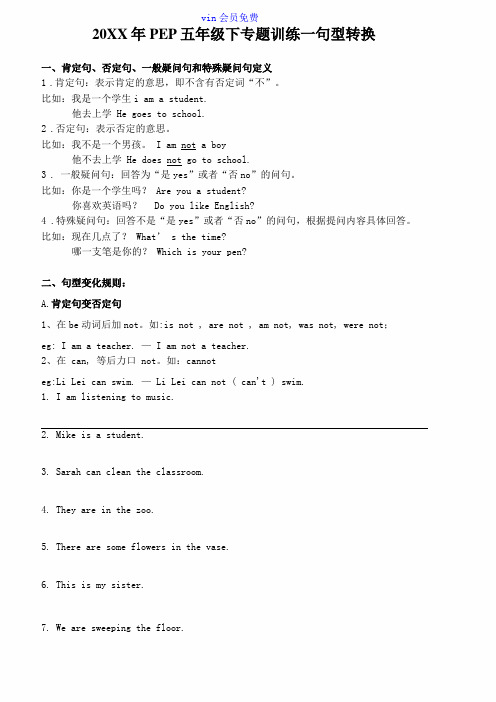
20XX年PEP五年级下专题训练一句型转换一、肯定句、否定句、一般疑问句和特殊疑问句定义1.肯定句:表示肯定的意思,即不含有否定词“不”。
比如:我是一个学生i am a student.他去上学 He goes to school.2.否定句:表示否定的意思。
比如:我不是一个男孩。
I am not a boy他不去上学 He does not go to school.3. 一般疑问句:回答为“是yes”或者“否no”的问句。
比如:你是一个学生吗? Are you a student?你喜欢英语吗?Do you like English?4.特殊疑问句:回答不是“是yes”或者“否no”的问句,根据提问内容具体回答。
比如:现在几点了?What’ s the time?哪一支笔是你的? Which is your pen?二、句型变化规则:A.肯定句变否定句1、在be动词后加not。
如:is not , are not , am not, was not, were not;eg: I am a teacher. — I am not a teacher.2、在 can, 等后力口 not。
如:cannoteg:Li Lei can swim. — Li Lei can not ( can't ) swim.1.I am listening to music.2.Mike is a student.3.Sarah can clean the classroom.4.They are in the zoo.5.There are some flowers in the vase.6.This is my sister.7.We are sweeping the floor.3、上述都没有的,在动词前加助动词否定形式do not, does not. (don’t/doesn’ t)eg:Mr Wang works in a factory. — Mr Wang doesn,t work in a factory.1.We need some masks.2.They like making the puppet.3.Su Hai and Su Yang live in a new house.3.1put a book on my head.5. They sing “In the classroom”together.6.We play basketball on Sundays.7. Tom likes listening to music8.肯定句变一般疑问句如何将一个肯定的陈述句改为一般疑问句:1、把be动词放在句首,剩下的照抄,(some改成any, my改成your等)句点改成问号。
l自问自答的否定句案利
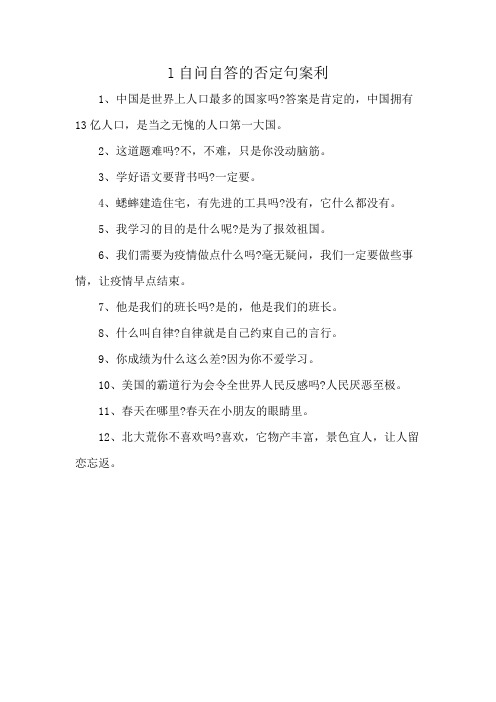
l自问自答的否定句案利
1、中国是世界上人口最多的国家吗?答案是肯定的,中国拥有13亿人口,是当之无愧的人口第一大国。
2、这道题难吗?不,不难,只是你没动脑筋。
3、学好语文要背书吗?一定要。
4、蟋蟀建造住宅,有先进的工具吗?没有,它什么都没有。
5、我学习的目的是什么呢?是为了报效祖国。
6、我们需要为疫情做点什么吗?毫无疑问,我们一定要做些事情,让疫情早点结束。
7、他是我们的班长吗?是的,他是我们的班长。
8、什么叫自律?自律就是自己约束自己的言行。
9、你成绩为什么这么差?因为你不爱学习。
10、美国的霸道行为会令全世界人民反感吗?人民厌恶至极。
11、春天在哪里?春天在小朋友的眼睛里。
12、北大荒你不喜欢吗?喜欢,它物产丰富,景色宜人,让人留恋忘返。
如何改否定句(六英)
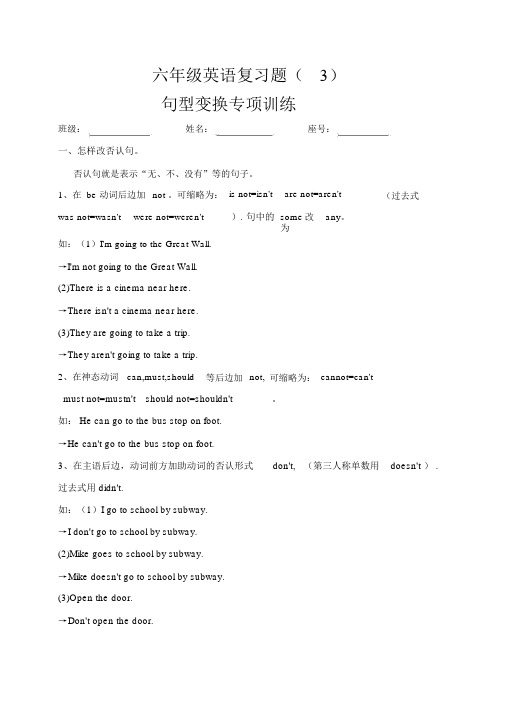
六年级英语复习题(3)句型变换专项训练班级:姓名:座号:一、怎样改否认句。
否认句就是表示“无、不、没有”等的句子。
1、在be 动词后边加not 。
可缩略为:is not=isn't are not=aren't(过去式was not=wasn't were not=weren't). 句中的some改any。
为如:(1)I'm going to the Great Wall.→I'm not going to the Great Wall.(2)There is a cinema near here.→There isn't a cinema near here.(3)They are going to take a trip.→They aren't going to take a trip.2、在神态动词can,must,should等后边加not,可缩略为:cannot=can'tmust not=mustn't should not=shouldn't。
如: He can go to the bus stop on foot.→He can't go to the bus stop on foot.3、在主语后边,动词前方加助动词的否认形式don't,(第三人称单数用doesn't ) .过去式用 didn't.如:(1)I go to school by subway.→I don't go to school by subway.(2)Mike goes to school by subway.→M ike doesn't go to school by subway.(3)Open the door.→D on't open the door.二、怎样改一般疑句。
- 1、下载文档前请自行甄别文档内容的完整性,平台不提供额外的编辑、内容补充、找答案等附加服务。
- 2、"仅部分预览"的文档,不可在线预览部分如存在完整性等问题,可反馈申请退款(可完整预览的文档不适用该条件!)。
- 3、如文档侵犯您的权益,请联系客服反馈,我们会尽快为您处理(人工客服工作时间:9:00-18:30)。
Try as she may, she is not necessarily able to talk him out of smoking.
雖然她會嘗試,卻未必能說服他戒煙。
Try as you may, you will find it impossible to solve the problem.
There’s always weather, weather, whether we like it or not.
老是有各種各樣的天氣,不論我們喜歡不喜歡。
Whether you will go (or not), please call me up. 不論你去不去,請打電話給我。
... or otherwise
結構︰形容詞+or otherwise
說明︰此句型意為“(不論)…或不…”。otherwise 表示和<形容詞>相反的意義。
Two characters are in disagreement, serious or otherwise, over some matter.
我已經決定買一部腳踏車,不論貴不貴。
Whether you believe it or not, I passed the exam. 不管你信不信,反正我通過了考試。
Whether he wanted it or not, he had to attend the lecture.
Whether he will stay or leave, I really don’t care. 我真的不在意他要留下來還是要走。
Whether the news is true or false, I won’t change my plan.
不管消息是真是假,我是不會改變計劃的。
我以為他會變好。但事實上,他愈變愈糟。
He isn’t nice. As it is, he is bad. 他不好。事實上,他很壞。
I don’t like him. As it is, I hate him. 我不喜歡他。事實上,我恨他。
雖然他是懦夫,卻無法忍受這樣的侮辱。
Try as you may, ...
結構︰原形動詞+as/though+主詞+may,…
說明︰此句型意為“雖然…,但是…”。等於“though+<主詞>+may+原形<動詞>”;此類變化僅限於句中有<助動詞> may 時。
Try as he may (=Though he may try), he will definitely fail.
Whether he will come (or not), we will go on with our plan.
不管他來不來,我們仍按原計劃進行。
I have decided to buy a bicycle, whether it is expensive or not.
兩個人物為某件事情發生了嚴重或不嚴重的衝突。
You must accept the result, satisfactory or otherwise.
你必須接受這個令人滿意或不滿意的結果。
The task assigned, dangerous or otherwise, must be finished as scheduled.
Good student as he is, ...
結構︰名詞+as+主詞+be 動詞,…
說明︰此句型意為“雖然…,但是…”。等於“though+<主詞>+be <動詞>+<名詞>”。若 be <動詞>之後的<名詞>是單數,移至句首後<冠詞>要省略。
Good students as they were (=Though they were good students), they sometimes erred.
雖然你會嘗試,但你會發現要解決這個問題是不可能的。
whether ... or ...
結構︰whether ... or ...
說明︰此句型意為“不論是…還是…”。whether 引導的<子句>句尾可用<對等連接詞> or,以連接對等的單字、<片語>。whether <子句>中的<主詞>若與<主要子句>相同時,則該<主詞>可省略;whether <子句>的句構若為“<主詞>+be <動詞>+<補語>”,而<補語>又對稱時,則可保留“<補語>+or+<補語>”,其餘部分則省略。
雖然他們是好學生,偶而也會犯錯。
Good student as he is (=Though he is a good student), he sometimes makes mistakes.
雖然他是好學生,偶而也會犯錯。
Coward as he is (=Though he is a coward), he can’t bear such an insult.
說明︰此句型意為“事實上…”。As it is ... 作<副詞子句>,置於句首,修飾後面的<主要子句>。等於 In fact 或 As a matter of fact。
I thought he would get better. As it is, he is getting worse.
Waking or sleeping, the matter is always in my mind.
不論是醒著還是睡著,這件事時常浮在我的腦中。
whether ... or not
結構︰whether+主詞+動詞+or not
說明︰此句型意為“不論…還是不…”。“whether ... or not”稱為<從屬連接詞>,連接詞性相同的單字,<片語>或<子句>,當“whether ... or ...”<句型>中的 or 之後對等的單字或<片語>若相同時,該單字或<片語>可省略,而以 not 代替;or not 也可省略;也可寫成 whether or not。
不管他願意與否,他非得去參加講座。
Whether or not he will stay, I really don’t care. 他要留下來還是要走,我真的不在意。
He is always happy whether rich or not. 不管窮還是富,他都快活。
Whether (she is) sick or fine, she is always cheerful. 不管她生不生病,她總是開開心心的。
(Whether we are) Rich or poor, we are all equal. 人不分貧富一律平等。
Rain or shine, the game will be he的工作,危險或不危險,必須如期完成。
as ... V ...
結構︰as+主詞+動詞…
說明︰此句型意為“按照…;如…”。as 是<副詞><連接詞>,等於“in the same way that”。
When in Rome, do as the Romans do. 入境隨俗。
Do as you are told. (=Do as I tell you.) 照我吩咐的做!
She cooks omelets in butter as they do in France. 她用奶油做法國式的蛋捲。
As it is ...
結構︰As it is ...
